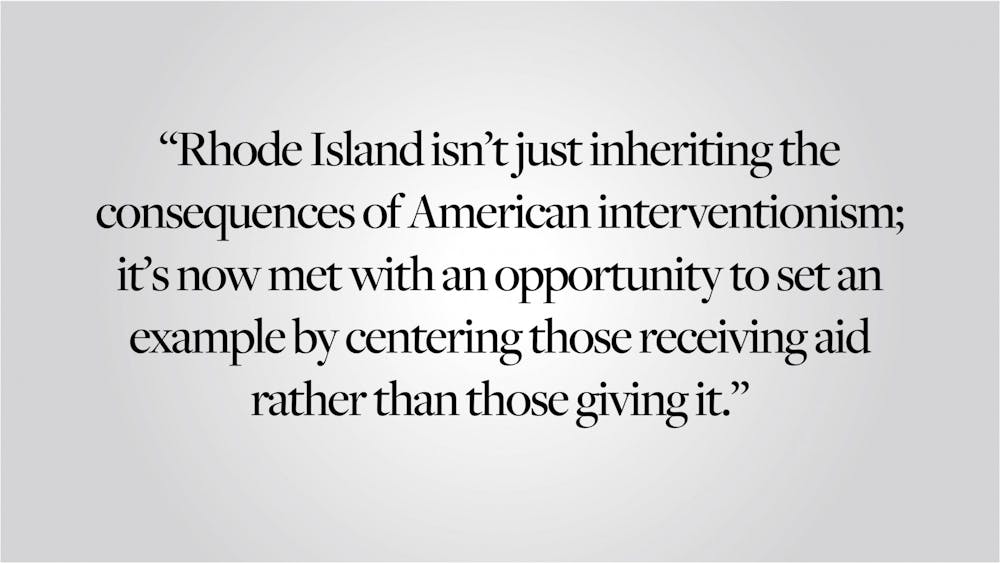Centuries after the freedom-seekers of Roger Willams’ time arrived in droves to Rhode Island to escape religious persecution, the state, along with the rest of the nation, finds itself in a new age of asylum. As the United States withdraws from Afghanistan, political rhetoric about the implications for Biden’s administration or the nation’s foreign policy has permeated the country. But there’s another perspective to consider: that of the displaced Afghan citizens leaving their country behind — up to 95,000 of whom will be resettled across America, including in its smallest state. New England is anticipating an influx of more than 1,500 refugees over the next several months. Over a dozen have already arrived in Rhode Island and an additional 250 refugees are projected to come to the state by the end of October and begin the long road of economic and social integration that lies ahead. It’s a crisis, but also an inflection point. Rhode Island isn’t just inheriting the consequences of American interventionism; it’s now met with an opportunity to set an example by centering those receiving aid rather than those giving it.
Much has been written about America’s responsibility to these Afghan citizens, along with refugees from a wide swath of other countries experiencing human rights crises. Providing shelter to those fleeing persecution is a mission that every nation should seek to undertake. However, the structures of humanitarian aid as they exist in America are guided by a specific vision of the nation as both a global policeman and a place of refuge for those fleeing violence in developing regions. This sense of responsibility can be slippery. When the rhetoric of so many politicians, including Rhode Island’s own, frames resettling refugees as a resource drain on the state, albeit a necessary one, it calls to mind the same schools of thought that gave rise to the concept of “The White Man’s Burden” over a century ago.
To be clear, there is nothing fundamentally wrong with the instinct to protect and promote human rights. The issue lies instead in the power dynamic inherent to almost any charity work that places its emphasis on the actors providing the aid as opposed to the ones receiving it. But, what then, are our options? The Trump administration defunded and destabilized the country’s programs for immigrant and refugee protections. And even before their budgets were slashed, those programs relied on the same problematic idea of responsibility through charity.
One way out of this dilemma lies in a practice that has long existed outside the margins of government — mutual aid. Mutual aid is a term that has many different meanings. In the context of welfare policy, it refers to the idea that structures of aid should be reciprocal, built from the bottom up and incorporate a large degree of input from the people they’re meant to serve, rather than remaining reliant on the goodwill of philanthropists or the government. The slogan often associated with the movement is “solidarity, not charity.” Initiatives like the Rhode Island Solidarity Fund, a combined effort of six statewide mutual aid groups, help consolidate fundraising to free the unjustly incarcerated and realize rapid responses to housing insecurity. Operating under the goals of “self-sufficiency and integration,” the Refugee Dream Center of Rhode Island — founded by Dr. Omar Bah, a refugee himself — hosts programs ranging from individual case management to health education courses. Local news has lauded the center and it finds success in part because it is run by a dedicated team of individuals who personally understand the intricacies of the refugee experience.
The deterioration of governmental humanitarian relief programs coupled with the steady lowering of refugee caps under the Trump administration was a disaster. However, as the country seeks to rebuild these programs, it is well positioned to reconceptualize how to expand them in ways that are more grounded in the realities they address. Collaboration with existing refugee communities and mutual aid networks is a way forward. For instance, consider a scenario where instead of having to build their budgets from the ground up, local organizations could draw from a pool of federal or state funding set aside specifically for mutual aid groups to widen the reach of their projects without having to change their tactics or structure. Mutual aid networks hold the solutions we need, but they require additional resources and attention invested directly into them rather than filtered through bureaucracies.
Championing the values behind mutual aid also means taking an active role in not only ensuring the security of families arriving on U.S. shores, but advocating for their rights and dignities. Refugees are provided with food and housing but they are still given only temporary immigration status, making it near impossible to establish lives and careers while also being denied access to visas and government programs. The conversation around resettling refugees reaches, at least in progressive circles, an easy consensus on the need to provide basic levels of material support. But it rarely extends into policy changes that would enable refugees to not only survive here, but to thrive.
Lawmakers and citizens alike should heed the calls of community organizers, invest in their projects and advocate for their visions. The issues leading Afghans to seek asylum may have global roots, but it is ultimately work at the local level that will have the most impact in determining their futures. Let them determine that future.
Alissa Simon ’25 can be reached at alissa_simon@brown.edu. Please send responses to this opinion to letters@browndailyherald.com and other op-eds to opinions@browndailyherald.com.





